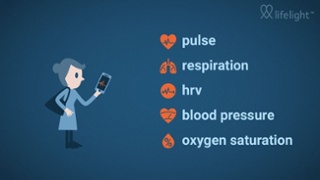SEARCH
Enter your search term below:
Close
Enter your search term below:

WORLD LEADING BUSINESS SUPPORT
We’ve developed a new digital technology called Lifelight which is able to measure patient vital signs: heart rate, respiratory rate, blood pressure and oxygen saturation in 60 seconds using just the camera built-in to an everyday device such as a smartphone, tablet or computer.
Lifelight doesn’t need any medical specialist hardware such as blood pressure cuffs, it’s completely passive and non-contact, and it’s also simple to use and very fast. Its only requirement is that the patient remains in sight of the camera for at least 30 seconds, while the readings take place. What it does is detect micro-tonal skin colour changes that signal your vital signs.
 Lifelight’s first target market is GPs working in Primary Care. We estimate that one third of NHS GP visits include vital signs observations, which can take several minutes to complete. Lifelight can run all readings concurrently in just one minute – creating a timesaving for the NHS worth £500m per year. Our second target market are people who, for example, self-monitor their blood pressure at home. Lifelight empowers individuals to self-manage their health more easily, keeping them better informed and identifying problems before they need to be admitted to hospital – this creates more savings for the NHS.
Lifelight’s first target market is GPs working in Primary Care. We estimate that one third of NHS GP visits include vital signs observations, which can take several minutes to complete. Lifelight can run all readings concurrently in just one minute – creating a timesaving for the NHS worth £500m per year. Our second target market are people who, for example, self-monitor their blood pressure at home. Lifelight empowers individuals to self-manage their health more easily, keeping them better informed and identifying problems before they need to be admitted to hospital – this creates more savings for the NHS.
If you’re a health entrepreneur find out more about our upcoming Health Innovation Programme
For 15 years I worked in NHS IT and healthcare technologies and I then went on to work in EU R&D projects for about 10 years, which was when I came across research being carried out by MIT Labs in the USA. They were studying camera-based pulse detection and I found it quite fascinating. Their research went in a different direction and others have since built on their findings. What we’ve done with Lifelight is engineer and integrate a practical solution from that research that works in the real-world.
The SETsquared Health Innovation Programme (HIP) was invaluable. It was a privilege to be locked away in a room for 4-days to concentrate on our business model. It gave us time to plan and reflect, enabling us to identify and hone what we were actually doing, so we could fine-tune our elevator pitch and explain to customers what our technology does.
Wessex Academic Health Science Network (AHSN) have been excellent, helping us make great connections and open doors with people who have engaged with our technology. I’ve not been directly involved in medical device development before, so it has been a huge learning curve. However, I’ve been supported in our work to gain regulatory approval and evidence through clinical trials.
My advice to anyone trying to bring a new healthcare device or technology to market is to network and make connections and partnerships. Entrepreneurs often stay in stealth mode thinking they mustn’t reveal their ideas in case others try to copy, but the best tactic is to massively reduce your risk of failure by building a network.
A big challenge in healthcare is establishing who the customer is – the beneficiaries are not always the customer. We’ve developed a time-saving technology for GPs but it’s the CCG that will be paying for it, they’re interested in their bottom-line and how Lifelight can reduce the number of hospital admissions so that the NHS saves money as a whole system. Therefore, your value proposition and who’s actually going to benefit from it are often two separate things.
I’m proud that Lifelight is set to play an important part in transforming healthcare. The NHS is a fantastic institution but there are huge challenges facing it, for example our aging demographic. We need to encourage people to self-manage and take responsibility for their own health, and make it easier and more affordable to deliver healthcare that is preventative rather than curative. I see this outcome as the key characteristic of Lifelight – making healthcare more preventative and more affordable.
![]()
Get all the fresh insights first! Stay up-to-date with all the
latest investment news, blogs and all things SETsquared.
Close
Close